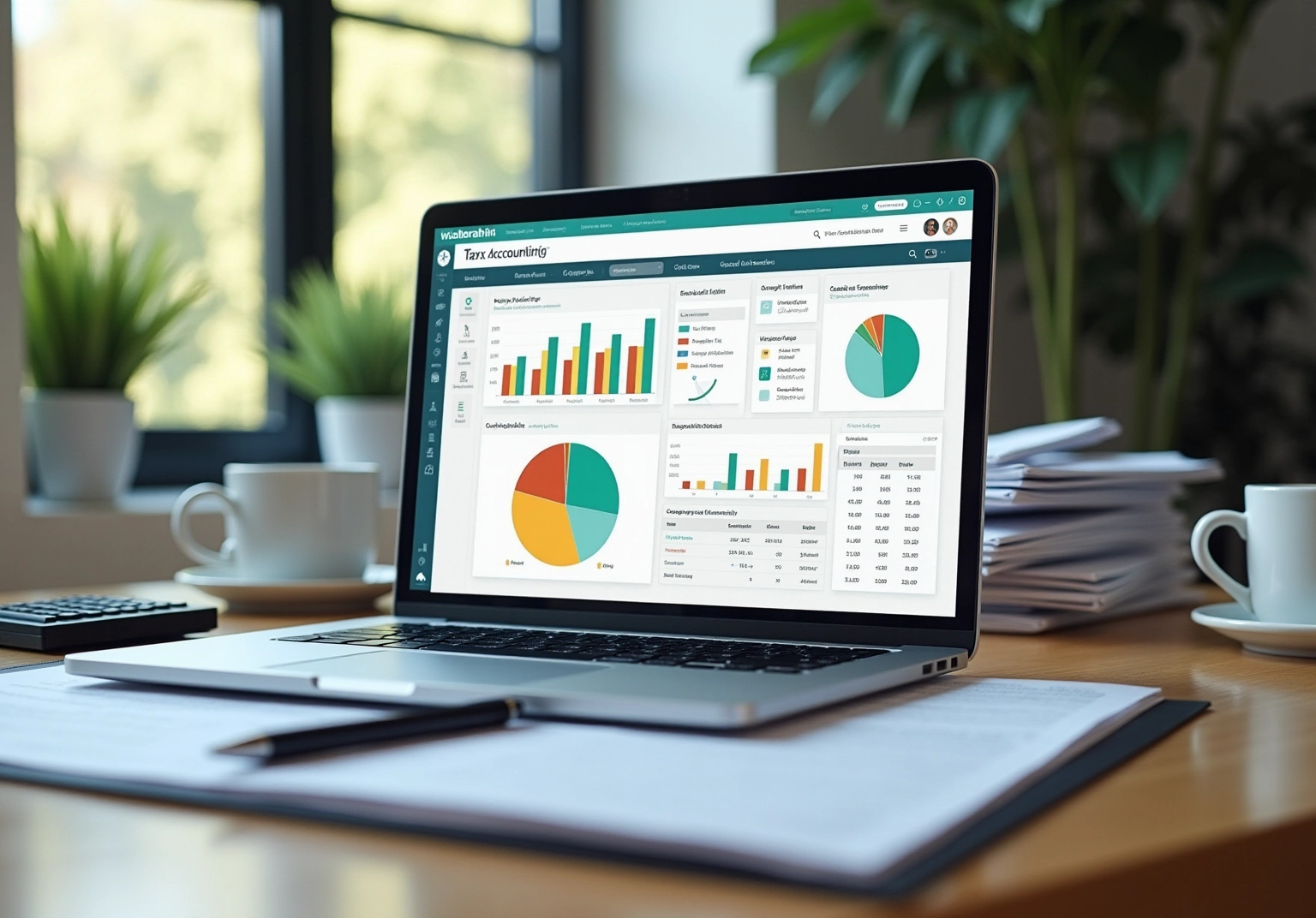Overview
When selecting tax accounting software for small businesses, key factors such as usability, automation, integration, compliance, support, and cost must be considered. These elements collectively enhance operational efficiency and ensure adherence to regulatory standards. Each factor plays a crucial role in improving financial management, with specific software solutions like QuickBooks and Xero standing out as exemplary choices that address diverse business needs effectively. By understanding these critical components, businesses can make informed decisions that lead to better financial outcomes.
Key Highlights:
- Tax accounting software is crucial for small businesses, improving financial operations and ensuring tax accuracy.
- Automation reduces human error, enhances efficiency, and provides real-time financial insights for informed decision-making.
- Glasscubes is highlighted for its user-friendly onboarding and features that improve client communication and engagement.
- 90% of small enterprises utilise technology to enhance productivity, showcasing the importance of advanced tools.
- Key criteria for evaluating tax software include usability, automation, integration, compliance, support, and cost.
- Top software solutions include QuickBooks, Xero, Sage, FreshBooks, and Zoho Books, each with unique features and advantages.
- QuickBooks is favoured for its comprehensive features and strong support, while Xero excels in collaboration and reporting.
- Sage is suitable for compliance-focused businesses, FreshBooks is ideal for freelancers, and Zoho Books offers a cost-effective solution.
- Choosing the right software aligns with specific business needs and enhances operational efficiency in a changing financial landscape.
Introduction
Selecting the appropriate tax accounting software is a pivotal decision for small businesses striving to adeptly navigate the complexities of financial management. As reliance on technology grows to enhance operations and ensure compliance, comprehending the key factors that influence this choice can profoundly affect a business’s financial well-being.
What features should small enterprises prioritise to not only fulfil regulatory requirements but also boost productivity and client engagement? This article explores the fundamental criteria for choosing tax accounting software, providing insights that empower businesses to make informed decisions in an ever-evolving financial landscape.
Importance of Tax Accounting Software for Small Businesses
Tax accounting software for small business is indispensable, as it streamlines financial operations and ensures accuracy in tax computations while adhering to regulatory requirements. By automating tasks such as data entry and report generation, these tools significantly reduce the risk of human error, which can lead to costly penalties. Moreover, they provide real-time insights into financial health, empowering informed decision-making.
Firms utilising tax software like Glasscubes have reported substantial improvements in efficiency, thanks to its user-friendly onboarding process and unlimited client engagement features. For instance, Glasscubes facilitates automated client email reminders and accommodates an unlimited number of information requests, enhancing communication and alleviating administrative burdens.
Notably, 90% of minor enterprises and 94% of major firms leverage technology to boost productivity, underscoring the vital role of advanced tools like Glasscubes in modern financial practises. Ultimately, the right software not only enhances operational efficiency but also cultivates a more organised approach to financial management, aligning with the evolving demands of the financial landscape in 2025.
Comparison Criteria for Tax Accounting Software
When evaluating tax accounting software, small businesses must focus on several essential criteria that can significantly enhance their operations:
- Usability: An intuitive interface is vital, allowing users to navigate the software with minimal training, thereby enhancing overall efficiency. Glasscubes offers a user-friendly interface that requires no training, making it simpler for accountants to interact with clients effectively.
- Automation: Features that automate repetitive tasks, such as data entry and report generation, can significantly reduce manual workload and improve accuracy. Firms using Glasscubes have reported a 50% reduction in response times and a 40% increase in client interaction, showcasing the effectiveness of automation in streamlining processes and enhancing client engagement.
- Integration: The software should seamlessly integrate with existing systems, such as CRM and payroll, to streamline operations and enhance productivity. Glasscubes is designed to work harmoniously with various platforms, ensuring a cohesive workflow across business functions.
- Compliance: It is essential to ensure the software adheres to current tax regulations, including Making Tax Digital (MTD) requirements, to avoid potential penalties. Glasscubes includes strong compliance elements that assist in protecting against regulatory concerns, ensuring that all required standards are fulfilled.
- Support and Resources: Assessing the availability of customer support and educational resources is crucial for helping users maximise the software’s capabilities. Glasscubes provides specialised onboarding support to assist companies in effectively implementing the tool, ensuring a seamless transition and optimal utilisation of its capabilities.
- Cost: Examine the pricing framework thoroughly, including any concealed charges for extra services or assistance, to ensure it matches the organisation’s budget and requirements. Understanding the total cost of ownership is vital for making an informed decision.
Integrating these criteria into the evaluation process of tax accounting software for small business can lead to more informed choices, ultimately improving the efficiency and effectiveness of tax practises.

Overview of Top Tax Accounting Software Solutions
Several tax accounting software solutions stand out in the market for small businesses, each offering unique advantages that can streamline financial management and enhance operational efficiency:
- QuickBooks: With its user-friendly interface and robust features, QuickBooks excels in automation capabilities, significantly reducing manual data entry. It integrates effortlessly with numerous tools, positioning it as a preferred option for small enterprises pursuing efficiency. In 2023, QuickBooks Online generated $8 billion in revenue, holding a substantial market share compared to competitors.
- Xero: This cloud-based solution is celebrated for its real-time collaboration functionalities and strong reporting capabilities. With more than 1,000 integrations, Xero is ideal for organisations that require flexibility and extensive functionality, improving team collaboration and financial oversight. Xero boasts a user satisfaction rating of 9.1 out of 10, underscoring its effectiveness in meeting user needs.
- Sage Business Cloud Accounting: Offering extensive features tailored for small enterprises, Sage emphasises adherence to essential tools for invoicing and expense monitoring, serving as a comprehensive tax accounting software for small business. Its integration with additional applications enhances its functionality, making it suitable for organisations with specific requirements for tax accounting software for small business. Sage 50 has received a user rating of 8.8 out of 10, indicating strong user approval.
- FreshBooks: Particularly well-suited for freelancers and small service-based businesses, FreshBooks excels in invoicing and client management. Its intuitive design and time-monitoring capabilities simplify billing procedures, ensuring prompt payments and improved cash flow management. FreshBooks has a rating of 6.1 out of 10, reflecting its strengths in user experience.
- Zoho Books: As a budget-friendly option, Zoho Books offers a comprehensive array of capabilities, including project management and time tracking. Its affordability and extensive features make it suitable for small teams seeking to enhance their financial processes. Zoho Books is recognised for its automation capabilities, contributing to overall efficiency for users.
Pros and Cons of Each Software Solution
Here’s an insightful breakdown of the pros and cons of the top tax accounting software solutions:
-
QuickBooks:
- Pros: Highly user-friendly, QuickBooks offers extensive features that cater to a wide range of accounting needs. It boasts strong customer support, which is crucial for users navigating complex financial tasks. Furthermore, QuickBooks is utilised by 64.4% of small enterprise owners, emphasising its popularity in the market.
- Cons: Although it offers a robust array of tools, the price can rise considerably for advanced options, making it less affordable for smaller enterprises.
-
Xero:
- Pros: Known for its excellent collaboration capabilities, Xero allows multiple users to work simultaneously, enhancing teamwork. Its strong reporting tools provide valuable insights into financial performance, making it a favourite among accountants. Additionally, Xero integrates with over 21,000 financial institutions for automatic transaction imports, streamlining financial processes.
- Cons: Xero’s offline capabilities are limited, which can be a drawback for users who need access without an internet connexion.
-
Sage Business Cloud Accounting:
- Pros: This software offers comprehensive features that cover various aspects of accounting, making it suitable for compliance and regulatory needs.
- Cons: New users may face a steeper learning curve, which can hinder quick adoption and effective use of the software.
-
FreshBooks:
- Pros: Particularly strong in invoicing, FreshBooks is easy to use, making it ideal for small businesses focused on billing and client management.
- Cons: It has restricted financial capabilities compared to its rivals, which may not satisfy the requirements of enterprises needing more sophisticated financial management. This limitation is considerable, particularly given that 69% of minor enterprise owners who utilise a financial expert feel more assured about their tax comprehension.
-
Zoho Books:
- Pros: A cost-effective solution that offers versatile features, making it appealing for startups and small businesses looking to manage their finances without breaking the bank.
- Cons: Customer support can be slow, which may frustrate users needing immediate assistance with their financial queries.
Suitability of Software for Different Business Needs
Selecting the right tax accounting software for small business is crucial, as it directly addresses the unique needs of each organisation.
- QuickBooks stands out for small to medium-sized businesses that require a comprehensive suite of features and robust customer support. This makes it a reliable choice for a variety of financial requirements.
- Xero excels in environments where collaboration and real-time data access are paramount, making it particularly beneficial for remote teams. Its cloud-based platform fosters seamless interaction among team members, significantly enhancing productivity.
- Sage Business Cloud Accounting is tailored for organisations that prioritise compliance, offering powerful accounting capabilities that ensure adherence to regulatory standards.
- FreshBooks is designed for freelancers and service-oriented businesses, providing effective invoicing and client management tools that simplify operations and improve cash flow.
- Zoho Books is an exceptional choice for startups and small businesses looking for tax accounting software that provides a cost-effective solution with essential features, allowing them to manage their finances without excessive expenditure.
As the accounting landscape continues to evolve, particularly with the increasing prevalence of remote work, it is imperative to choose software that aligns with specific industry demands and team dynamics. This strategic selection is vital for achieving success.
Conclusion
Choosing the right tax accounting software is essential for small businesses seeking to enhance their financial management and ensure compliance. By understanding the critical factors that influence this decision, businesses can significantly improve their operational efficiency and client engagement. The appropriate software not only simplifies tax processes but also aligns with the evolving demands of the financial landscape.
This article has highlighted several key criteria to consider when selecting tax accounting software, including:
- Usability
- Automation
- Integration
- Compliance
- Support
- Cost
Each of these factors plays a vital role in determining how well the software meets the unique needs of a business. Furthermore, an overview of top solutions such as QuickBooks, Xero, Sage, FreshBooks, and Zoho Books provides insights into their strengths and weaknesses, assisting businesses in making informed choices based on their specific requirements.
Ultimately, the decision regarding which tax accounting software to adopt should reflect a strategic understanding of the business’s operational needs and future goals. As technology continues to reshape the financial landscape, investing in the right tools can lead to increased efficiency, reduced errors, and enhanced compliance. Small businesses are encouraged to carefully assess their options and prioritise features that will not only meet regulatory demands but also drive productivity and growth in the years to come.
